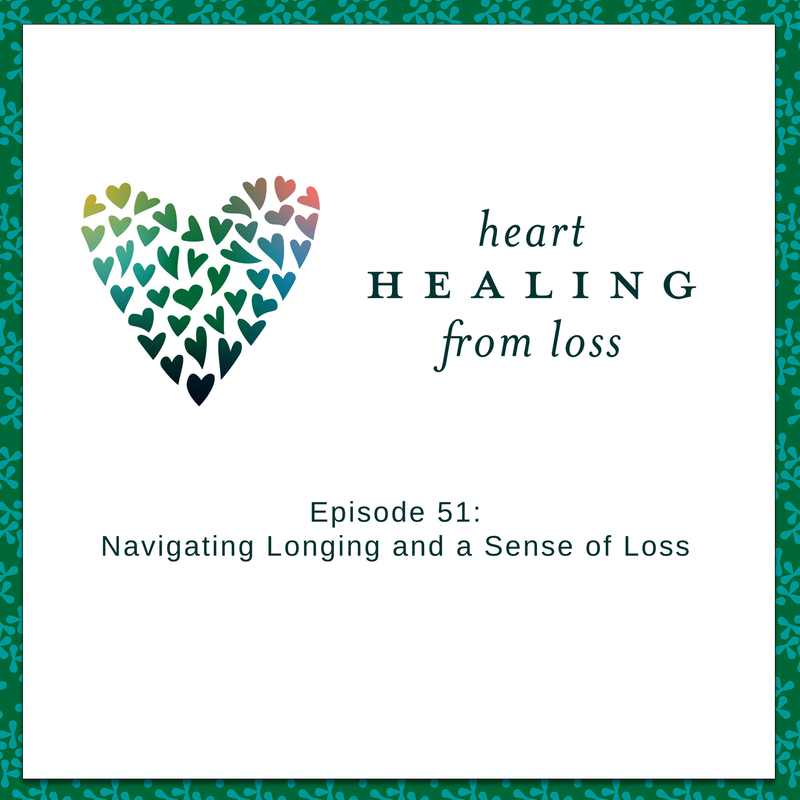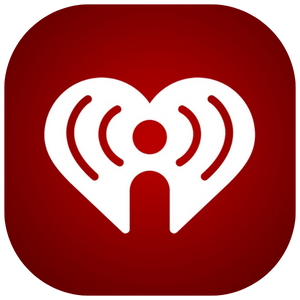Episode 51: Navigating Longing and a Sense of Loss
|
Loss means change.
And in times of change, there's a feeling of, "It's not what it was" or "It's not what it used to be." We long for the way it used to be. But what is it — specifically — that we're missing or wishing were back to the way it was before? Being specific about the loss or the change can help us manage our way through the grief. "It is what it is" On the other hand, there's the phrase "It is what it is." Can we just say...ugh. "It is what it is" cuts the conversation short and can seem dismissive of our pain and sadness. Again, understanding our response to "it is what it is" can help us manage the emotions around whatever "it" is now. |
You are Invited
What phrases or cliches create emotions in you? And do you sometimes feel like you could use help to handle those emotions? If so, be sure to contact Grief Coach Wendy Sloneker for a complimentary consultation. You can find her at her website, https://www.wendysloneker.com/.
What phrases or cliches create emotions in you? And do you sometimes feel like you could use help to handle those emotions? If so, be sure to contact Grief Coach Wendy Sloneker for a complimentary consultation. You can find her at her website, https://www.wendysloneker.com/.
As seen on: |
|
Full Episode Transcript
Wendy Sloneker
You are listening to the Heart Healing from Loss podcast with Wendy Sloneker. And this sweet friends is episode 51.
Hi, hi, we are deep into the throes of early winter. Isn't that funny like that word choice is hilarious, deep into the throes of early winter are not that far in. But there are cold snaps, there's snow in the world. There's chill in the air in some places. And sometimes that even means it's chilly at a beach. For reals. That's true in some cases all year.
High just reflecting here. And wanted to set the tone because there's a phrase that comes up frequently and it has to do sometimes with winter relevantly at winter, when days get shorter and nights are longer. And it's already kind of tough.
At night anyway, for many grievers who are going through a season of of real big loss or medium sized loss or small size, loss, and change loss means change, after all, right.
So a phrase that comes up frequently is, it's not what it was, or it's not what it used to be. And this is true. And that is a fine place to just have that sentence be complete.
But there's some healing, and there's some opportunity that can be done if we take it into some specifics. So I want to talk today about navigating a sense of change, in a sense of loss. And that sense is, it's not what it was, or what what is happening today is no longer the same way that it was or the the people that I used to be working with or living with, or people that I loved. Or not, it's not the same anymore. Having that sense of it's not what it used to be, and navigating a sense of loss from from that understanding. It's something that is subtle, it's not an active conscious thought we would have, but it is it does relate to longing.
So as we move forward in our, our understanding, just sort of like plant that in your understanding for now, that's what we're going to be talking about. So when we say something like, it's not what it used to be, it's wide open ended. And, of course, that is true. And of course you will you know what you're talking about, about your experience of being in a different place, or missing someone who used to be there, or customs getting different, or language getting different, or any of those things that involve the significant change that's making you stop and long for or reflect on a way that it used to be.
So there's value in getting specific. There's just value in owning and acknowledging and claiming your experience of, of what it is you're talking about. Even, even if you're just thinking it in your mind, even if your heart is just having a space of like, hey, owl, and it's not, it's not what it used to be. And so being with yourself around it instead of you know, some options that I observe and have tried are shut down, or avoidance or I'm gonna distract myself or I'm gonna go find a slave of Oreos.
These sorts of things. This is a common, these are common responses. It's a brave thing to take another minute and to just keep going a little bit to be with that thought. It reminds me of another thought that just made me furious with an ex girlfriend of mine. When she used to say it all the time. She used to say it all the time and it just got I think the word rankle is appropriate here.
Very rankled which is also fun to say I highly recommend you trying it on in your mouth.
So she used to say some thing like, No, this is exactly what she would say. It is what it is. And it felt like a dismissal. It felt like a shutdown, it felt like, you know, stop talking about it, or I need to stop thinking about it. That was more for her than than anybody it was. It is what it is. And I know the intention was probably definitely, you know, the intention was for her herself, but also just as a way of marking what's real.
I, however, was like, Well, if it is what it is, then I would like to know what it is. What is it? Like it is what it is means. Okay, and let's define let's take it like just a step closer a step deeper. Like, let's define what, what this mark of reality is. I didn't get what I wanted. I'm upset. I'm hurt. I'm annoyed, I'm rankled. And, and why didn't what else is? What else is there? What else? Is there this part of reality that I don't like?
What does that mean? And so when we go to like, I felt more comfortable when it was the way that it was I was familiar with what was happening back when it was different. I don't like this change. I'm not comfortable here. It's not familiar, I don't feel safe. I don't know what to expect.
You can get more specific to what that what that person just said just annoyed me. And I didn't have to deal with it back when it was different. I feel confronted in this moment. Valid, totally valid and real.
So I want to honor your truth and wisdom in identifying but it's not what it used to be, or it's not what it was. And I want to be there for you around. Like just another minute of how it was different. What was different about it? Why was it better back then? Or easier back then? Or? Or whatever comes up? Because why did it feel safer then?
These are the questions. These are the questions that are simple but not easy. And that also allow for more truth to be revealed. When I say truth. I really am talking about your emotional experience, your experience and your emotional truth.
It's important it needs to be in gets to be heard. So it can go
Oh, yes. Oh, yes.
I have, I have a space for you in addition to this podcast. It's a group over on Facebook that I started this week.
And it's called Pen to Paper Daily Community. This is not a perfection oriented spot. I do not have a formulaic anything. If you are someone who does morning pages via the incredible Julia Cameron, yes, bring your practice over. If you have a spiritual practice that requires pen to paper in some way. Bring it over, like totally involved if you're writing a book and you're doing some poetry, or you just are trying to have more space where you decompress your own mind and relieve some pressure by putting pen to paper. This is for you.
Join me over at Pen to Paper Daily Community. This is one of those tedious practices that the brain doesn't like and tries to say, you know, I can handle it all up here in my mind. But and there's so much relief that can come when you release you your thoughts, your feelings, what's going on your observations to the page, there are prompts. There's going to be some videos over there. We're gonna do some check ins. It's just another way to move through. I don't know if you knew this or not, but writing is a form of release.
Read more about it. Ask me about it. I want to invite you, I'll probably invite you every week because it's a nice place to just get closer to take some space and to allow some emotional pain to be transformed.
I made it for us. If this is interesting to you, please come join me. If it's not interesting to you, that's okay. You're 100% always invited. And please come back to this podcast too. Thanks for spending a little bit of time with me this week. I hope today's episode was valuable and useful as you go into your next coming days and weeks, through the winter. Heck, all the time. This is totally repeatable in all the ways.
Okay, I'm thinking of you this week. Take real sweet care of yourself. And I'll talk to you next week. Okay, bye.
Hi, this is Wendy, thank you so much for being here and spending time with me for you. Yeah, the whole purpose of walking through grief and loss is to find out how to feel better. Did you know there are tools and skills to be learned about how to do this? Yeah, for real, and I do it. Let's get on a connection call. It's a 45 minute free call. We'd love to offer to you when you're ready. And we'll just see if we'd be a good fit to work together.
If you're ready for a little more support, and not less, and if you're ready to feel a little bit better. And to find out how to learn these tools and skills.
I'm ready for you.
Reach out through my website. Connect with me directly through [email protected] and we'll set it up. Heck yeah, we will. All right. Till then take really good care. Bye bye
You are listening to the Heart Healing from Loss podcast with Wendy Sloneker. And this sweet friends is episode 51.
Hi, hi, we are deep into the throes of early winter. Isn't that funny like that word choice is hilarious, deep into the throes of early winter are not that far in. But there are cold snaps, there's snow in the world. There's chill in the air in some places. And sometimes that even means it's chilly at a beach. For reals. That's true in some cases all year.
High just reflecting here. And wanted to set the tone because there's a phrase that comes up frequently and it has to do sometimes with winter relevantly at winter, when days get shorter and nights are longer. And it's already kind of tough.
At night anyway, for many grievers who are going through a season of of real big loss or medium sized loss or small size, loss, and change loss means change, after all, right.
So a phrase that comes up frequently is, it's not what it was, or it's not what it used to be. And this is true. And that is a fine place to just have that sentence be complete.
But there's some healing, and there's some opportunity that can be done if we take it into some specifics. So I want to talk today about navigating a sense of change, in a sense of loss. And that sense is, it's not what it was, or what what is happening today is no longer the same way that it was or the the people that I used to be working with or living with, or people that I loved. Or not, it's not the same anymore. Having that sense of it's not what it used to be, and navigating a sense of loss from from that understanding. It's something that is subtle, it's not an active conscious thought we would have, but it is it does relate to longing.
So as we move forward in our, our understanding, just sort of like plant that in your understanding for now, that's what we're going to be talking about. So when we say something like, it's not what it used to be, it's wide open ended. And, of course, that is true. And of course you will you know what you're talking about, about your experience of being in a different place, or missing someone who used to be there, or customs getting different, or language getting different, or any of those things that involve the significant change that's making you stop and long for or reflect on a way that it used to be.
So there's value in getting specific. There's just value in owning and acknowledging and claiming your experience of, of what it is you're talking about. Even, even if you're just thinking it in your mind, even if your heart is just having a space of like, hey, owl, and it's not, it's not what it used to be. And so being with yourself around it instead of you know, some options that I observe and have tried are shut down, or avoidance or I'm gonna distract myself or I'm gonna go find a slave of Oreos.
These sorts of things. This is a common, these are common responses. It's a brave thing to take another minute and to just keep going a little bit to be with that thought. It reminds me of another thought that just made me furious with an ex girlfriend of mine. When she used to say it all the time. She used to say it all the time and it just got I think the word rankle is appropriate here.
Very rankled which is also fun to say I highly recommend you trying it on in your mouth.
So she used to say some thing like, No, this is exactly what she would say. It is what it is. And it felt like a dismissal. It felt like a shutdown, it felt like, you know, stop talking about it, or I need to stop thinking about it. That was more for her than than anybody it was. It is what it is. And I know the intention was probably definitely, you know, the intention was for her herself, but also just as a way of marking what's real.
I, however, was like, Well, if it is what it is, then I would like to know what it is. What is it? Like it is what it is means. Okay, and let's define let's take it like just a step closer a step deeper. Like, let's define what, what this mark of reality is. I didn't get what I wanted. I'm upset. I'm hurt. I'm annoyed, I'm rankled. And, and why didn't what else is? What else is there? What else? Is there this part of reality that I don't like?
What does that mean? And so when we go to like, I felt more comfortable when it was the way that it was I was familiar with what was happening back when it was different. I don't like this change. I'm not comfortable here. It's not familiar, I don't feel safe. I don't know what to expect.
You can get more specific to what that what that person just said just annoyed me. And I didn't have to deal with it back when it was different. I feel confronted in this moment. Valid, totally valid and real.
So I want to honor your truth and wisdom in identifying but it's not what it used to be, or it's not what it was. And I want to be there for you around. Like just another minute of how it was different. What was different about it? Why was it better back then? Or easier back then? Or? Or whatever comes up? Because why did it feel safer then?
These are the questions. These are the questions that are simple but not easy. And that also allow for more truth to be revealed. When I say truth. I really am talking about your emotional experience, your experience and your emotional truth.
It's important it needs to be in gets to be heard. So it can go
Oh, yes. Oh, yes.
I have, I have a space for you in addition to this podcast. It's a group over on Facebook that I started this week.
And it's called Pen to Paper Daily Community. This is not a perfection oriented spot. I do not have a formulaic anything. If you are someone who does morning pages via the incredible Julia Cameron, yes, bring your practice over. If you have a spiritual practice that requires pen to paper in some way. Bring it over, like totally involved if you're writing a book and you're doing some poetry, or you just are trying to have more space where you decompress your own mind and relieve some pressure by putting pen to paper. This is for you.
Join me over at Pen to Paper Daily Community. This is one of those tedious practices that the brain doesn't like and tries to say, you know, I can handle it all up here in my mind. But and there's so much relief that can come when you release you your thoughts, your feelings, what's going on your observations to the page, there are prompts. There's going to be some videos over there. We're gonna do some check ins. It's just another way to move through. I don't know if you knew this or not, but writing is a form of release.
Read more about it. Ask me about it. I want to invite you, I'll probably invite you every week because it's a nice place to just get closer to take some space and to allow some emotional pain to be transformed.
I made it for us. If this is interesting to you, please come join me. If it's not interesting to you, that's okay. You're 100% always invited. And please come back to this podcast too. Thanks for spending a little bit of time with me this week. I hope today's episode was valuable and useful as you go into your next coming days and weeks, through the winter. Heck, all the time. This is totally repeatable in all the ways.
Okay, I'm thinking of you this week. Take real sweet care of yourself. And I'll talk to you next week. Okay, bye.
Hi, this is Wendy, thank you so much for being here and spending time with me for you. Yeah, the whole purpose of walking through grief and loss is to find out how to feel better. Did you know there are tools and skills to be learned about how to do this? Yeah, for real, and I do it. Let's get on a connection call. It's a 45 minute free call. We'd love to offer to you when you're ready. And we'll just see if we'd be a good fit to work together.
If you're ready for a little more support, and not less, and if you're ready to feel a little bit better. And to find out how to learn these tools and skills.
I'm ready for you.
Reach out through my website. Connect with me directly through [email protected] and we'll set it up. Heck yeah, we will. All right. Till then take really good care. Bye bye






